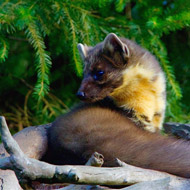Rare pine marten spotted in Kielder Forest

Pine martens were once common throughout the UK.
A rare pine marten has been spotted in Northumberland’s Kielder Forest for the first time in more than 90 years.
The weasel-like mammal was captured by cameras set up to monitor red squirrels in a remote area of Kielder Water and Forest Park.
Earlier this year, ecologists captured what is thought to be the first ever footage of a pine marten in Northumberland. However, this is the first time that one has been spotted inside the forest since it was planted in 1926.
John Hartshorn, who has been helping with the squirrel surveys, discovered the footage:
"This July I have caught some excellent pictures of red squirrels but also an unexpected visitor - a pine marten, sitting on top of one of the squirrel feeders,” he said. “This was most unexpected but I now have both still pictures and a short piece of video firmly placing pine marten in Kielder Water & Forest Park.”
Pine martens were once common throughout the UK, but habitat clearance and persecution have led to a dramatic decline in their numbers.
Forestry Commission ecologist Tom Dearnley said: “As the forest nears 100 years in age, it is increasingly being colonised by rare and protected species. Pine marten returning to England, over the Scottish border, have been anticipated for some time and we are delighted to see photographic evidence of their return, a great endorsement of how we manage public forests.”
Simon O’Hare, project manager for Red Squirrels Northern England at Northumberland Wildlife Trust added: “It is well documented that grey squirrels out-compete red squirrels for food and also pass on a deadly virus, squirrel pox, to reds: this is one of the main reasons that the species is under threat.
“The natural return of pine martens in areas of northern England is an exciting prospect, as it could have a knock-on effect by suppressing grey numbers, allowing native red squirrels to prosper once again in our woodlands.”



 The RCVS has announced a new version of its 1CPD mobile app, with enhanced features for veterinary surgeons and veterinary nurses to record their continuing professional development.
The RCVS has announced a new version of its 1CPD mobile app, with enhanced features for veterinary surgeons and veterinary nurses to record their continuing professional development.